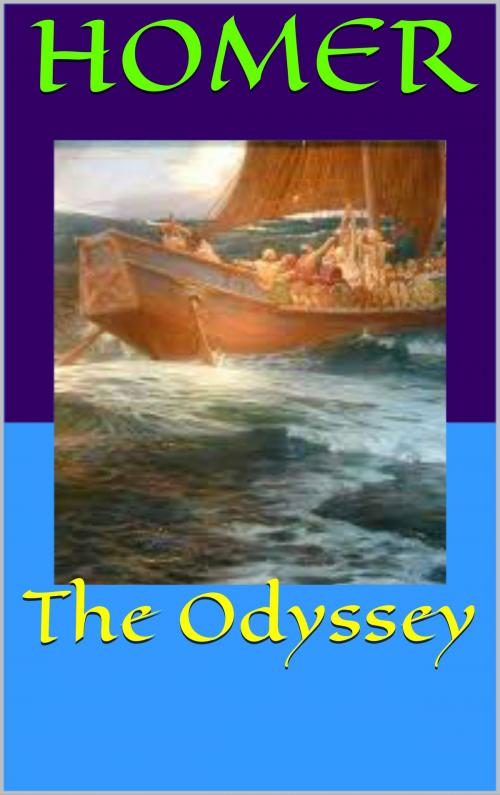| Author: | Homer | ISBN: | 1230003329399 |
| Publisher: | Homer | Publication: | July 20, 2019 |
| Imprint: | Language: | English |
| Author: | Homer |
| ISBN: | 1230003329399 |
| Publisher: | Homer |
| Publication: | July 20, 2019 |
| Imprint: | |
| Language: | English |
The Odyssey by Homer, translated by William Cowper (1731–1800)
********
The Odyssey is one of the two major ancient Greek epic poems (the other being the Iliad), attributed to the poet Homer. The poem is commonly dated to between 800 and 600 bc. The poem is, in part, a sequel to the Iliad, and concerns the events that befall the Greek hero Odysseus in his long journey back to his native land Ithaca after the fall of Troy.
— Excerpted from Odyssey on Wikipedia, the free encyclopedia.
This edition was translated by William Cowper and published in London in 1791 alongside his Iliad. This digital edition was completed by Project Gutenberg in 2008.
The spelling and hyphenation in the original are inconsistent and have not been changed in this text. Transliterations of Greek passages are available through mouse-hover popups. Typographical errors have been left as found in the original (restored from Project Gutenberg corrections).
******
extract:
BOOK I
ARGUMENT
In a council of the Gods, Minerva calls their attention to Ulysses, still a wanderer. They resolve to grant him a safe return to Ithaca. Minerva descends to encourage Telemachus, and in the form of Mentes directs him in what manner to proceed. Throughout this book the extravagance and profligacy of the suitors are occasionally suggested.
Muse make the man thy theme, for shrewdness famed
And genius versatile, who far and wide
A Wand’rer, after Ilium overthrown,
Discover’d various cities, and the mind
And manners learn’d of men, in lands remote.
He num’rous woes on Ocean toss’d, endured,
Anxious to save himself, and to conduct
His followers to their home; yet all his care
Preserved them not; they perish’d self-destroy’d
By their own fault; infatuate! who devoured
The oxen of the all-o’erseeing Sun,
And, punish’d for that crime, return’d no more.
Daughter divine of Jove, these things record,
As it may please thee, even in our ears.
The rest, all those who had perdition ’scaped
By war or on the Deep, dwelt now at home;
Him only, of his country and his wife
Alike desirous, in her hollow grots
Calypso, Goddess beautiful, detained
Wooing him to her arms. But when, at length,
(Many a long year elapsed) the year arrived
Of his return (by the decree of heav’n)
To Ithaca, not even then had he,
Although surrounded by his people, reach’d
The period of his suff’rings and his toils.
Yet all the Gods, with pity moved, beheld
His woes, save Neptune; He alone with wrath
Unceasing and implacable pursued
Godlike Ulysses to his native shores.
But Neptune, now, the Æthiopians fought,
(The Æthiopians, utmost of mankind,
These Eastward situate, those toward the West)
The Odyssey by Homer, translated by William Cowper (1731–1800)
********
The Odyssey is one of the two major ancient Greek epic poems (the other being the Iliad), attributed to the poet Homer. The poem is commonly dated to between 800 and 600 bc. The poem is, in part, a sequel to the Iliad, and concerns the events that befall the Greek hero Odysseus in his long journey back to his native land Ithaca after the fall of Troy.
— Excerpted from Odyssey on Wikipedia, the free encyclopedia.
This edition was translated by William Cowper and published in London in 1791 alongside his Iliad. This digital edition was completed by Project Gutenberg in 2008.
The spelling and hyphenation in the original are inconsistent and have not been changed in this text. Transliterations of Greek passages are available through mouse-hover popups. Typographical errors have been left as found in the original (restored from Project Gutenberg corrections).
******
extract:
BOOK I
ARGUMENT
In a council of the Gods, Minerva calls their attention to Ulysses, still a wanderer. They resolve to grant him a safe return to Ithaca. Minerva descends to encourage Telemachus, and in the form of Mentes directs him in what manner to proceed. Throughout this book the extravagance and profligacy of the suitors are occasionally suggested.
Muse make the man thy theme, for shrewdness famed
And genius versatile, who far and wide
A Wand’rer, after Ilium overthrown,
Discover’d various cities, and the mind
And manners learn’d of men, in lands remote.
He num’rous woes on Ocean toss’d, endured,
Anxious to save himself, and to conduct
His followers to their home; yet all his care
Preserved them not; they perish’d self-destroy’d
By their own fault; infatuate! who devoured
The oxen of the all-o’erseeing Sun,
And, punish’d for that crime, return’d no more.
Daughter divine of Jove, these things record,
As it may please thee, even in our ears.
The rest, all those who had perdition ’scaped
By war or on the Deep, dwelt now at home;
Him only, of his country and his wife
Alike desirous, in her hollow grots
Calypso, Goddess beautiful, detained
Wooing him to her arms. But when, at length,
(Many a long year elapsed) the year arrived
Of his return (by the decree of heav’n)
To Ithaca, not even then had he,
Although surrounded by his people, reach’d
The period of his suff’rings and his toils.
Yet all the Gods, with pity moved, beheld
His woes, save Neptune; He alone with wrath
Unceasing and implacable pursued
Godlike Ulysses to his native shores.
But Neptune, now, the Æthiopians fought,
(The Æthiopians, utmost of mankind,
These Eastward situate, those toward the West)




![Cover of the book THE ODYSSEY Classic Novels: New Illustrated [Free Audio Links] by Homer](https://www.kuoky.com/images/2013/january/300x300/1230000103014-vfWL_300x.jpg)










